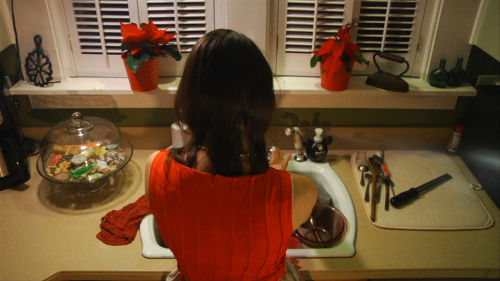Hot Docs '14: Actress
 Wednesday, April 30, 2014 at 9:00PM
Wednesday, April 30, 2014 at 9:00PM [Amir, our Canadian correspondent, is reporting from The Hot Docs Film Festival, the biggest documentary festival in North America currently underway in Toronto.]

Where does an act end for a performer? What happens if the persona seeps in so deep that the performer can never shake it off? Can an actress adopt the traits of the characters she once embodied so deeply that she permanently remains in their skin? How far can passion for the craft take an artist? These are all questions that Robert Greene’s intelligent, artfully constructed documentary, Actress, poses to the audience in the first few minutes.
The subject, Brandy Burre, played the part of Theresa D’Agostino, a recurring character over a 15-episode arc in the third and fourth seasons of The Wire. She was never a star, but her future seemed bright, having taken a prominent role in one of television’s best reviewed series...
Yet, her life took a different turn when she decided to move to the small town of Beacon, New York, with her partner Tim after she fell pregnant in the third month of their relationship. Motherhood and the suburban existence was a lifestyle she seemingly welcomed at the time but a few years later, with two young children and ever-shrinking intimacy in her relationship, Burre yearns for a return to the stage. She performs small singing gigs at The Duplex piano bar in New York, but faces the usual, unfortunate obstacles that most women in the entertainment industry face.
Burre has reached the age where roles for women become harder to come by every day. Her years away from the spotlight haven’t helped her either. Actress charts the process of Burre's coming to terms with these difficulties. Yet, there is something more to the film than generalized, however legitimate, grievances about the industry’s treatment of women at large. Actress is an incredibly personal film, one that closes in on its central character and externalizes her inner complexities with grace. It offers a nuanced portrayal of the actress, neither as a vessel through whom simplified ideas about women in film can be deduced, nor as merely a victim of her circumstance. Burre lends the film such complexity, offering a “performance” that teeters back and forth between refined artistry and selfless emotional honesty. The boundaries between the two are intriguingly blurred.
From the opening scene, a slow motion shot of the actress from behind, clad in an incongruously gorgeous red dress, washing dishes as she narrates her experience of being unable to leave her character, “I break things” she says, before proceeding to let a glass slip from her grasp to the floor. This is a sequence that introduces Brandy not just as a natural performer, elegantly embodying a role even in such a mundane setting, but also a woman who’s deeply aware of her ambitions and limitations.

It is quite startling that Actress shifts immediately to a jittery camera after this sequence, and the handheld approach is used throughout most of the rest of the film, with the exception of multiple other slow motion inserts that follow the actress intently and serve to highlight her innate expressiveness. Gradually the director’s visual choices come into focus and gain thematic importance. Intercutting the film’s nervous aesthetic with grand, hauntingly scored, slow motion sequences isn’t just a formal game; it cathects the film with intellectual and emotional depth and reflects Brandy’s evolving, perturbed personality. She is a performer whose every gesture suggests a search for a stage that deserves her, but is shackled by her troubled personal life all the same; these shifting tides are carefully aestheticized. Consequently, Actress is, above all else, a film about the line at which presented and represented realities meet, the point where performance becomes truth. That the film tackles these intricate concepts with vigorous formal inventiveness and a unique and fluid visual style makes it an exceptional treat. It belongs to that rare breed of documentary film that doesn’t content itself with merely observing its fascinating subject, but engages with it on a textual level. It's a film we will certainly be hearing about a lot in the next few months; one can only hope the critical attention to Greene and Burre's work transceneds beyond their collaboration here.
 Actress,
Actress,  Hot Docs,
Hot Docs,  Robert Greene,
Robert Greene,  The Wire,
The Wire,  documentaries,
documentaries,  film festivals
film festivals 


Reader Comments (4)
Hm. I don't remember her from the Wire but this sounds totally fascinating. Great review too.
Goran, she played Carcetti's campaign manager.
Hollywood like our federal government will not change. It will not alter the course its on. Nor will it have to reconsider. We're programmed to accept the unacceptable for just a portion of our desire. The plight of female and minority talent (racial and sexual) will not alter no matter the amount of protest through art. This film included.
W00t! I am Twitter friends with Robert Greene. Really excited for this.
"The plight of female and minority talent (racial and sexual) will not alter no matter the amount of protest through art. This film included."
This isn't a Kirby Dick-like advocacy doc, though, so I am not sure, especially sight unseen, that you dismiss it. Greene comes from the Frederic Wiseman school of non-fiction filmmaking and is pretty militant about the fact that documentaries are their own thing and should be understood in capturing the non-fiction than, 'Hey! Ain't this a shame?' short-term memory, caught in the moment kind of documentaries.